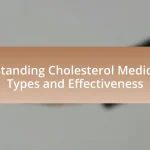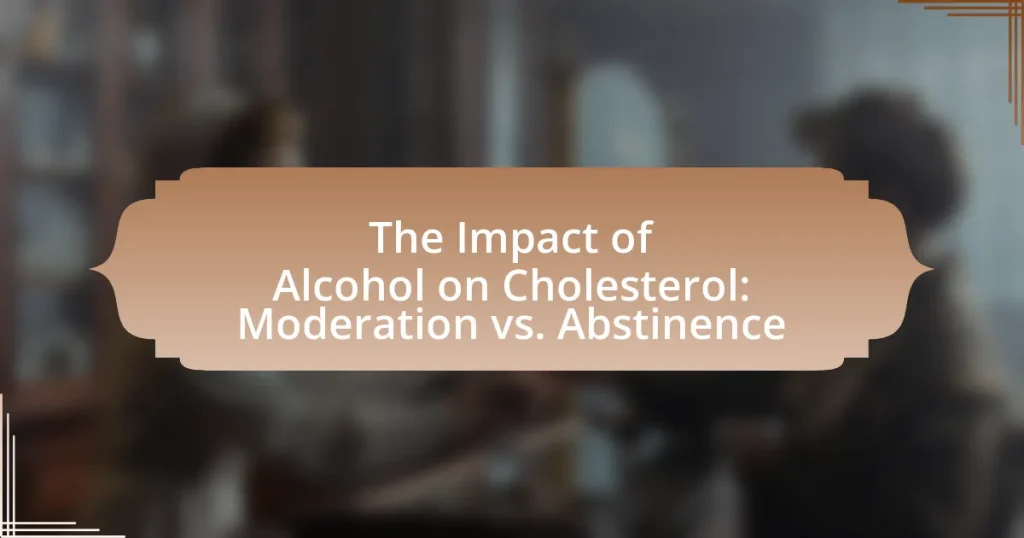The article examines the relationship between alcohol consumption and cholesterol levels, focusing on the debate between moderation and abstinence. It highlights that moderate alcohol intake, particularly from sources like red wine, can increase high-density lipoprotein (HDL) cholesterol, which is beneficial for heart health, while excessive consumption can lead to elevated low-density lipoprotein (LDL) cholesterol and triglycerides, increasing cardiovascular risks. The article also discusses the metabolic effects of alcohol on cholesterol, the potential health benefits of moderate drinking, and the risks associated with heavy drinking, emphasizing the importance of informed choices regarding alcohol consumption for maintaining healthy cholesterol levels.

What is the relationship between alcohol and cholesterol?
Alcohol consumption can influence cholesterol levels, primarily by increasing high-density lipoprotein (HDL) cholesterol, often referred to as “good” cholesterol. Studies indicate that moderate alcohol intake, particularly from sources like red wine, is associated with higher HDL levels, which can reduce the risk of cardiovascular disease. For instance, research published in the Journal of the American College of Cardiology found that moderate drinkers had higher HDL cholesterol levels compared to non-drinkers. However, excessive alcohol consumption can lead to negative health effects, including increased triglycerides and potential liver damage, which can adversely affect overall cholesterol levels.
How does alcohol consumption affect cholesterol levels?
Alcohol consumption can influence cholesterol levels by increasing high-density lipoprotein (HDL) cholesterol, often referred to as “good” cholesterol, while potentially raising low-density lipoprotein (LDL) cholesterol, known as “bad” cholesterol, depending on the amount consumed. Moderate alcohol intake, defined as up to one drink per day for women and up to two drinks per day for men, has been associated with higher HDL levels, which can reduce the risk of heart disease. However, excessive alcohol consumption can lead to elevated triglycerides and LDL cholesterol, contributing to cardiovascular issues. Studies indicate that moderate drinkers tend to have better cholesterol profiles compared to non-drinkers or heavy drinkers, highlighting the importance of moderation in alcohol consumption for maintaining healthy cholesterol levels.
What types of cholesterol are influenced by alcohol?
Alcohol primarily influences high-density lipoprotein (HDL) cholesterol levels. Moderate alcohol consumption has been associated with increased HDL cholesterol, which is often referred to as “good” cholesterol because it helps remove other forms of cholesterol from the bloodstream. Studies indicate that moderate drinking can raise HDL levels by approximately 10-20%. Conversely, excessive alcohol intake can lead to elevated triglycerides and low-density lipoprotein (LDL) cholesterol, which is known as “bad” cholesterol, potentially increasing the risk of cardiovascular diseases.
How does the body metabolize alcohol in relation to cholesterol?
The body metabolizes alcohol primarily in the liver, where enzymes convert ethanol into acetaldehyde and then into acetic acid, which can influence cholesterol levels. Alcohol consumption can lead to increased levels of high-density lipoprotein (HDL) cholesterol, often referred to as “good” cholesterol, while excessive intake may result in elevated triglycerides and low-density lipoprotein (LDL) cholesterol, which are associated with cardiovascular risks. Studies indicate that moderate alcohol consumption may have a beneficial effect on cholesterol profiles, but excessive drinking can lead to dyslipidemia, highlighting the importance of moderation in alcohol intake for maintaining healthy cholesterol levels.
What are the potential benefits of moderate alcohol consumption on cholesterol?
Moderate alcohol consumption can potentially increase high-density lipoprotein (HDL) cholesterol levels, which is often referred to as “good” cholesterol. Research indicates that moderate drinking, particularly of red wine, may enhance HDL cholesterol due to the presence of antioxidants like resveratrol. A study published in the American Journal of Clinical Nutrition found that individuals who consumed alcohol in moderation had higher HDL levels compared to non-drinkers. This increase in HDL cholesterol is associated with a lower risk of cardiovascular disease, as HDL helps transport cholesterol away from the arteries and back to the liver for excretion.
How does moderate alcohol intake impact HDL cholesterol?
Moderate alcohol intake positively impacts HDL cholesterol levels. Studies indicate that consuming alcohol in moderation, typically defined as one drink per day for women and up to two drinks per day for men, can lead to an increase in high-density lipoprotein (HDL) cholesterol, which is known as “good” cholesterol. Research published in the Journal of the American College of Cardiology found that moderate alcohol consumption is associated with higher HDL cholesterol levels, which can contribute to a lower risk of cardiovascular disease. This effect is attributed to alcohol’s ability to enhance the production of HDL cholesterol in the liver and improve its transport in the bloodstream.
What studies support the benefits of moderate alcohol consumption?
Studies indicate that moderate alcohol consumption can have cardiovascular benefits. For instance, research published in the Journal of the American College of Cardiology by Mukamal et al. (2003) found that moderate drinkers had a lower risk of coronary heart disease compared to abstainers. Additionally, a meta-analysis in the British Medical Journal by Ronksley et al. (2011) concluded that moderate alcohol intake is associated with a reduced risk of heart disease and stroke. These studies collectively support the notion that moderate alcohol consumption may positively influence cardiovascular health.
What are the risks associated with excessive alcohol consumption and cholesterol?
Excessive alcohol consumption significantly increases the risk of high cholesterol levels, leading to cardiovascular diseases. Alcohol can raise triglyceride levels and contribute to the development of fatty liver, which in turn affects cholesterol metabolism. Studies indicate that individuals who consume large amounts of alcohol are more likely to experience elevated low-density lipoprotein (LDL) cholesterol and reduced high-density lipoprotein (HDL) cholesterol, both of which are risk factors for heart disease. For instance, research published in the Journal of Clinical Lipidology found that heavy drinking correlates with higher LDL levels and lower HDL levels, emphasizing the detrimental effects of excessive alcohol on cholesterol balance and overall heart health.
How does heavy drinking affect LDL cholesterol levels?
Heavy drinking increases LDL cholesterol levels, contributing to a higher risk of cardiovascular diseases. Studies indicate that excessive alcohol consumption can lead to dyslipidemia, characterized by elevated levels of low-density lipoprotein (LDL) cholesterol. For instance, research published in the Journal of Clinical Lipidology found that individuals consuming more than two alcoholic drinks per day had significantly higher LDL cholesterol levels compared to moderate drinkers. This relationship underscores the detrimental effects of heavy alcohol intake on lipid profiles and overall heart health.
What are the long-term health implications of high alcohol intake on cholesterol?
High alcohol intake can lead to increased levels of triglycerides and low-density lipoprotein (LDL) cholesterol, which are associated with a higher risk of cardiovascular diseases. Chronic excessive alcohol consumption disrupts lipid metabolism, resulting in elevated cholesterol levels and contributing to the development of atherosclerosis. Studies indicate that individuals consuming more than moderate amounts of alcohol may experience significant alterations in their lipid profiles, with one study published in the Journal of Clinical Lipidology showing that heavy drinkers had a 20% increase in LDL cholesterol compared to moderate drinkers. This long-term effect on cholesterol levels underscores the importance of alcohol moderation to maintain cardiovascular health.

What is the debate between moderation and abstinence regarding alcohol and cholesterol?
The debate between moderation and abstinence regarding alcohol and cholesterol centers on the differing health implications of consuming alcohol in limited amounts versus completely avoiding it. Proponents of moderation argue that moderate alcohol consumption, particularly red wine, may raise high-density lipoprotein (HDL) cholesterol levels, which is beneficial for heart health. Studies, such as one published in the Journal of the American College of Cardiology, indicate that moderate drinkers may have a lower risk of coronary heart disease compared to abstainers. Conversely, advocates for abstinence highlight the risks associated with alcohol consumption, including potential increases in triglycerides and the likelihood of developing alcohol-related health issues, which can outweigh any cholesterol benefits. Research from the American Heart Association suggests that even moderate drinking can lead to negative health outcomes for some individuals, particularly those with a history of alcohol abuse or certain medical conditions. Thus, the debate hinges on balancing potential cardiovascular benefits against the risks of alcohol consumption.
Why do some experts recommend moderation over abstinence?
Some experts recommend moderation over abstinence because moderate alcohol consumption can have beneficial effects on cholesterol levels. Research indicates that moderate drinking, particularly of red wine, is associated with higher levels of high-density lipoprotein (HDL) cholesterol, which is known to protect against heart disease. A study published in the Journal of the American College of Cardiology found that individuals who consumed alcohol in moderation had a 30-50% lower risk of coronary heart disease compared to non-drinkers. This evidence supports the idea that moderation can provide cardiovascular benefits while avoiding the potential negative consequences of complete abstinence.
What evidence supports moderate drinking as beneficial for cholesterol?
Moderate drinking is associated with beneficial effects on cholesterol levels, particularly in increasing high-density lipoprotein (HDL) cholesterol. Research published in the Journal of the American College of Cardiology indicates that moderate alcohol consumption, defined as one drink per day for women and up to two drinks per day for men, can raise HDL cholesterol levels by 4-10%. Additionally, a meta-analysis in the American Journal of Clinical Nutrition found that moderate alcohol intake is linked to a 25% reduction in the risk of coronary heart disease, which is often associated with favorable cholesterol profiles. These findings suggest that moderate drinking may play a role in improving cholesterol levels and overall cardiovascular health.
How do cultural attitudes influence the perception of alcohol consumption?
Cultural attitudes significantly shape the perception of alcohol consumption by establishing norms and values that dictate acceptable drinking behaviors. For instance, in cultures where alcohol is integrated into social rituals, such as toasting at celebrations, consumption is often viewed positively and associated with social bonding. Conversely, in societies with strong religious or health-oriented beliefs against alcohol, drinking may be stigmatized, leading to negative perceptions and reduced consumption. Research indicates that these cultural frameworks can influence individual choices, as seen in a study by the World Health Organization, which found that cultural context accounts for variations in drinking patterns and attitudes across different populations.
What are the arguments for complete abstinence from alcohol?
Complete abstinence from alcohol is argued to be beneficial for overall health, particularly in relation to cholesterol levels. Abstaining from alcohol eliminates the risk of alcohol-induced increases in triglycerides, which can contribute to heart disease. Research indicates that even moderate alcohol consumption can lead to elevated cholesterol levels in some individuals, making complete abstinence a safer choice for those at risk. Additionally, studies show that individuals who abstain from alcohol often experience improved liver function and reduced risk of developing alcohol-related diseases, further supporting the argument for complete abstinence.
How does abstinence impact overall health beyond cholesterol levels?
Abstinence from alcohol significantly enhances overall health beyond cholesterol levels by reducing the risk of various chronic diseases and improving mental well-being. Research indicates that abstaining from alcohol lowers the likelihood of developing conditions such as liver disease, certain cancers, and cardiovascular issues. For instance, a study published in the Journal of Studies on Alcohol and Drugs found that individuals who abstain from alcohol have a 30% lower risk of developing liver cirrhosis compared to those who consume alcohol regularly. Additionally, abstinence can lead to improved mental health outcomes, including reduced anxiety and depression, as noted in a review by the National Institute on Alcohol Abuse and Alcoholism, which highlights the positive effects of sobriety on emotional stability and cognitive function.
What are the risks of alcohol dependency and its effects on cholesterol?
Alcohol dependency significantly increases the risk of developing cardiovascular diseases and adversely affects cholesterol levels. Chronic alcohol consumption can lead to elevated triglycerides and low-density lipoprotein (LDL) cholesterol, which are risk factors for heart disease. Studies indicate that individuals with alcohol dependency often experience a decrease in high-density lipoprotein (HDL) cholesterol, which is protective against heart disease. According to research published in the Journal of Clinical Lipidology, heavy drinking is associated with a 20% increase in triglyceride levels and a 10% decrease in HDL cholesterol. This combination of effects heightens the risk of atherosclerosis and other cardiovascular complications.

How can individuals make informed choices about alcohol and cholesterol?
Individuals can make informed choices about alcohol and cholesterol by understanding the relationship between alcohol consumption and cholesterol levels. Research indicates that moderate alcohol intake, particularly red wine, may have a beneficial effect on cholesterol by increasing high-density lipoprotein (HDL) levels, which is known as “good” cholesterol. However, excessive alcohol consumption can lead to elevated triglycerides and lower low-density lipoprotein (LDL) levels, which is associated with cardiovascular disease. The American Heart Association recommends moderation, defined as up to one drink per day for women and up to two drinks per day for men, to balance potential benefits and risks. Individuals should also consult healthcare professionals to assess their personal health conditions and cholesterol levels, ensuring that their choices align with their overall health goals.
What guidelines should individuals follow regarding alcohol consumption and cholesterol management?
Individuals should limit alcohol consumption to moderate levels to effectively manage cholesterol. The American Heart Association defines moderate drinking as up to one drink per day for women and up to two drinks per day for men. Excessive alcohol intake can lead to increased triglyceride levels, which negatively impact cholesterol profiles and overall heart health. Studies indicate that high alcohol consumption is associated with higher levels of LDL cholesterol and lower levels of HDL cholesterol, increasing cardiovascular risk. Therefore, adhering to these guidelines can help maintain healthier cholesterol levels and reduce the risk of heart disease.
How can one assess their own alcohol consumption habits?
To assess one’s own alcohol consumption habits, individuals should track their drinking patterns over a specific period, noting the frequency and quantity of alcohol consumed. This self-monitoring can be facilitated by using a journal or mobile app designed for tracking alcohol intake. Research indicates that regular self-assessment can lead to increased awareness of consumption levels, which is crucial for understanding its impact on health, including cholesterol levels. For instance, the National Institute on Alcohol Abuse and Alcoholism suggests that recognizing drinking patterns can help individuals make informed decisions about moderation or abstinence, ultimately influencing their overall health outcomes.
What role do healthcare professionals play in advising on alcohol and cholesterol?
Healthcare professionals play a crucial role in advising patients on the relationship between alcohol consumption and cholesterol levels. They provide evidence-based guidance on how alcohol can influence lipid profiles, emphasizing that moderate alcohol intake may have a protective effect on heart health, while excessive consumption can lead to elevated cholesterol levels and other cardiovascular risks. Research indicates that moderate alcohol consumption is associated with higher levels of high-density lipoprotein (HDL) cholesterol, which is beneficial, but healthcare professionals also highlight that the risks of alcohol, including addiction and liver disease, often outweigh these benefits. Therefore, they tailor their advice based on individual health conditions, lifestyle factors, and the latest clinical guidelines to ensure patients make informed decisions regarding alcohol and cholesterol management.
What practical tips can help maintain healthy cholesterol levels while considering alcohol consumption?
To maintain healthy cholesterol levels while considering alcohol consumption, individuals should limit alcohol intake to moderate levels, defined as up to one drink per day for women and up to two drinks per day for men. Research indicates that excessive alcohol consumption can lead to increased triglyceride levels and negatively impact heart health. Additionally, choosing lower-calorie alcoholic beverages, such as light beer or wine, can help minimize calorie intake and reduce the risk of weight gain, which is associated with higher cholesterol levels. Regular monitoring of cholesterol levels and consulting with a healthcare provider can further support maintaining healthy cholesterol while consuming alcohol.
How can diet and lifestyle changes complement alcohol moderation or abstinence?
Diet and lifestyle changes can significantly enhance alcohol moderation or abstinence by promoting overall health and reducing cravings. A balanced diet rich in fruits, vegetables, whole grains, and lean proteins can stabilize blood sugar levels, which helps mitigate the urge to consume alcohol. Regular physical activity, such as aerobic exercise, has been shown to improve mood and reduce stress, further decreasing the likelihood of turning to alcohol for relief. Research indicates that individuals who adopt healthier eating habits and engage in consistent exercise report lower levels of alcohol consumption and a greater ability to maintain abstinence. For instance, a study published in the journal “Alcoholism: Clinical and Experimental Research” found that participants who followed a structured diet and exercise program experienced a significant reduction in alcohol intake compared to those who did not.
What resources are available for individuals seeking support in managing alcohol intake?
Individuals seeking support in managing alcohol intake can access various resources, including counseling services, support groups, and educational programs. Counseling services, such as those offered by licensed therapists or addiction specialists, provide personalized strategies for reducing alcohol consumption. Support groups like Alcoholics Anonymous (AA) offer community-based support and shared experiences to help individuals maintain sobriety. Additionally, educational programs, often provided by healthcare organizations, inform individuals about the effects of alcohol on health, including its impact on cholesterol levels, thereby promoting informed decision-making regarding alcohol intake.










